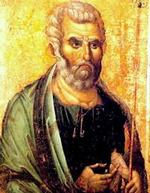Catholic Dictionary
Find accurate definitions of over 5,000 Catholic terms and phrases (including abbreviations). Based on Fr. John Hardon's Modern Catholic Dictionary, © Eternal Life. Used with permission.
Random Term from the Dictionary:
JOHN THE APOSTLE
A son of Zebedee and a brother of another Apostle, James. Both were fishermen and were among the first to be called to follow Jesus (Mark 1:19). Their mother may have been Salome, the sister of Jesus' mother -- which would make the brothers the cousins of Jesus (John 19:25). It seems safe to affirm that John was "the beloved disciple," though nowhere is he specifically named. He was the closest to Jesus at the Last Supper (John 13:23), and it was to John (the only Apostle present on Calvary) that Jesus entrusted his mother (John 19:26-27). On several occasions John was accorded a special place. He was allowed to accompany Jesus to Jairus' home when the latter's daughter was brought back to life. He was present at the Transfiguration (Matthew 17:1-2). Finally, he was one of the three who went with Jesus to Gethsemane (Mark 14:33). It was appropriate that he would be the Apostle to hasten with Peter to the tomb on Easter morning and be the first to proclaim belief in the Risen Christ (John 20:1-10). Several references are made to him in the Acts of the Apostles. He was present in the upper room with the Apostles after the Ascension (Acts 1:13). He accompanied Peter when the lame man was cured in the Temple (Acts 3:1-10). Again he went with Peter to pray for the Samaritans to receive the Holy Spirit (Acts 8:14-17). The most lasting memorial of his work, of course, was his biblical writings. Three short epistles are attributed to him because in style and doctrine they are sol closely akin to the fourth Gospel. The Book of Revelation, the last book of the New Testament, written during the final quarter of the century, is credited to John. Likewise, the fourth Gospel in Johannine in spirit and tone. It was obviously the work of one close to Jesus, an eyewitness of his ministry, and one who loved him intensely. The style and vocabulary are Semitic. The writer was thoroughly familiar with the customs and geography of Palestine. His close association with Peter and James is significant. John must have been the author. Some have held that he was martyred with his brother in A.D. 44, but if that is true he could not have written either the Gospel or Revelation, which were not written till some years later. In 1907 the Pontifical Biblical Commission denied that the arguments against John's authorship were valid. The weight of evidence indicates that he was the only Apostle not to be martyred. He probably died at the very end of the century. (Etym. Greek iôannēs, from Hebrew yochanan, Yahweh is gracious.)






